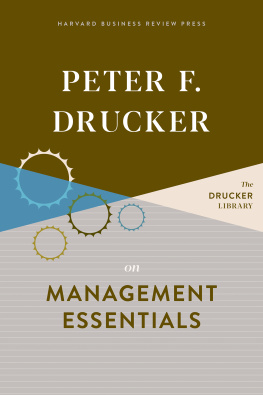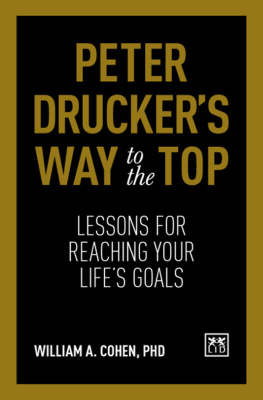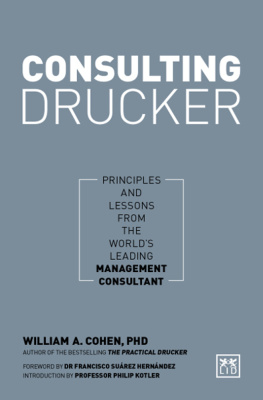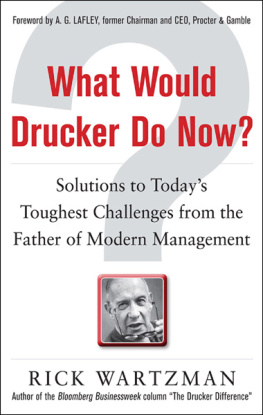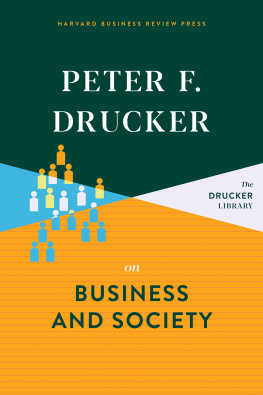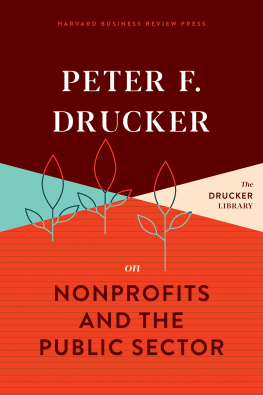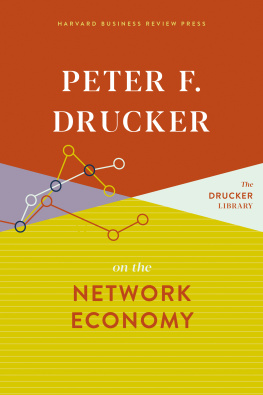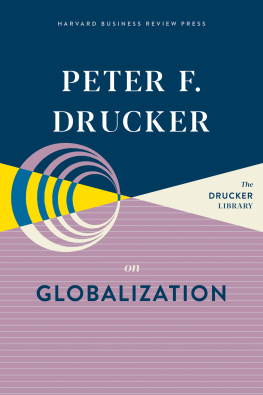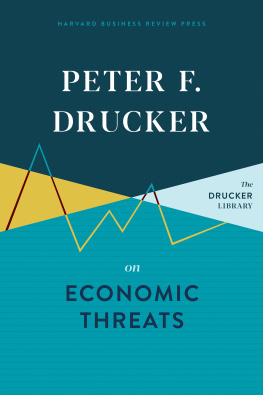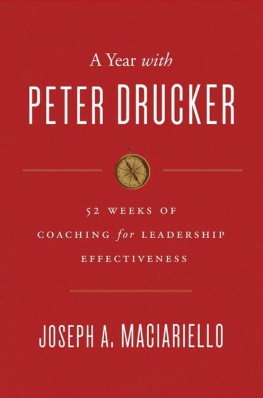Advanced Praise for The Drucker Lectures
Peter Drucker shined a light in a dark and chaotic world, and his words remain as relevant today as when he first spoke them. Druckers lectures and thoughts deserve to be considered by every person of responsibility, now, tomorrow, ten years from now, fifty, and a hundred.
Jim Collins, author of Good to Great and How the Mighty Fall
Rick Wartzman has brought Peter Drucker alive again, and vividly so, in his own words. These samples of his talks and lectures, because they were spoken not written, will be new to almost all of us. A great and unexpected treat.
Charles Handy, author of Myself and Other More Important Matters
Peter Druckers ideas continue to resonate powerfully today. His lectures on effectiveness, innovation, the social sector, education and so much more provide fresh insights that extend beyond his other writings and provide lessons for us all. This book is a gem.
Wendy Kopp, CEO and founder of Teach for America
Rick Wartzman has performed a great service in pulling together The Drucker Lectures. The collection is as far-ranging as Druckers thinking and writing. If you have sampled Drucker before, you will find things you havent seen. Peters ideas live on. You will be energized by reading them anew.
Paul ONeill, former U.S. Secretary of the Treasury
Peter Drucker inspires awe. From the 1940s until his death a few years ago, he displayed a combination of insight, prescience, and productivity that few will ever match. This superbly edited collection captures both the range of Druckers thinking and the sweep of history that informed it. The Drucker Lectures is a riveting read that reveals the depth and subtlety of one of Americas most remarkable minds.
Daniel H. Pink, author of A Whole New Mind and Drive
Rick Wartzman really has brought Peter to life in The Drucker Lectures. Reading this book, I practically felt as though I were seated in the audience, listening to my friend and hero, Peter Druckertruly one of the great geniuses of management. These lectures are as vital today as they were when Peter delivered them. They cover significant territory, from the importance of faith and the individual to the rise of the global economy. Its a classic collection that belongs on every managers bookshelf.
Ken Blanchard, coauthor of The One Minute Manager and Leading at a Higher Level
Thank you, Rick Wartzman, for the pleasure of learning from the witty, informal Peter Drucker as his ideas unfold and his remarkable mind grapples with challenges of management that are still with us today.
Rosabeth Moss Kanter, Harvard Business School Professor and author of Confidence and SuperCorp: How Vanguard Companies Create Innovation, Profits, Growth, and Social Good
The DRUCKER LECTURES
The DRUCKER LECTURES
ESSENTIAL LESSONS ON MANAGEMENT, SOCIETY, AND ECONOMY
Peter F. Drucker
Edited and with an Introduction by
Rick Wartzman


Copyright 2010 by The Drucker Institute. All rights reserved. Manufactured in the United States of America. Except as permitted under the United States Copyright Act of 1976, no part of this publication may be reproduced or distributed in any form or by any means, or stored in a database or retrieval system, without the prior written permission of the publisher.
ISBN: 978-0-07-175950-2
MHID: 0-07-175950-6
The material in this eBook also appears in the print version of this title: ISBN: 978-0-07-170045-0, MHID: 0-07-170045-5.
All trademarks are trademarks of their respective owners. Rather than put a trademark symbol after every occurrence of a trademarked name, we use names in an editorial fashion only, and to the benefit of the trademark owner, with no intention of infringement of the trademark. Where such designations appear in this book, they have been printed with initial caps.
McGraw-Hill eBooks are available at special quantity discounts to use as premiums and sales promotions, or for use in corporate training programs. To contact a representative please e-mail us at bulksales@mcgraw-hill.com.
TERMS OF USE
This is a copyrighted work and The McGraw-Hill Companies, Inc. (McGraw-Hill) and its licensors reserve all rights in and to the work. Use of this work is subject to these terms. Except as permitted under the Copyright Act of 1976 and the right to store and retrieve one copy of the work, you may not decompile, disassemble, reverse engineer, reproduce, modify, create derivative works based upon, transmit, distribute, disseminate, sell, publish or sublicense the work or any part of it without McGraw-Hills prior consent. You may use the work for your own noncommercial and personal use; any other use of the work is strictly prohibited. Your right to use the work may be terminated if you fail to comply with these terms.
THE WORK IS PROVIDED AS IS. McGRAW-HILL AND ITS LICENSORS MAKE NO GUARANTEES OR WARRANTIES AS TO THE ACCURACY, ADEQUACY OR COMPLETENESS OF OR RESULTS TO BE OBTAINED FROM USING THE WORK, INCLUDING ANY INFORMATION THAT CAN BE ACCESSED THROUGH THE WORK VIA HYPERLINK OR OTHERWISE, AND EXPRESSLY DISCLAIM ANY WARRANTY, EXPRESS OR IMPLIED, INCLUDING BUT NOT LIMITED TO IMPLIED WARRANTIES OF MERCHANTABILITY OR FITNESS FOR A PARTICULAR PURPOSE. McGraw-Hill and its licensors do not warrant or guarantee that the functions contained in the work will meet your requirements or that its operation will be uninterrupted or error free. Neither McGraw-Hill nor its licensors shall be liable to you or anyone else for any inaccuracy, error or omission, regardless of cause, in the work or for any damages resulting there from. McGraw-Hill has no responsibility for the content of any information accessed through the work. Under no circumstances shall McGraw-Hill and/or its licensors be liable for any indirect, incidental, special, punitive, consequential or similar damages that result from the use of or inability to use the work, even if any of them has been advised of the possibility of such damages. This limitation of liability shall apply to any claim or cause whatsoever whether such claim or cause arises in contract, tort or otherwise.
Contents
Introduction
You can picture him perched on the edge of a classroom table, peering through thick glasses at the students who hang on his every word. His baritone voice washes over the room, his Austrian accent as thick as a Sachertorte.
He doesnt refer to any written notes. But every now and again, his eyes roll back in his head and he pauses, almost like a computer downloading a store of information, before returning to his point and underscoring it with a new set of facts and figures.
His protean mind meanders from topic to topica discussion on cost accounting bleeding into a riff on Mesopotamian city-states before he veers into a lesson on the history of higher education or health care. But, somehow, he magically ties it all together in the end. In his hands, discursiveness becomes a fine art. And he delivers the entire talk with charm and humor and a genial style that, as one pupil has put it, recasts the chilly lecture hall to the size and comfort of a living room.
Peter Drucker, widely hailed as the greatest management thinker of all time, is best known for the 39 books he wrote. Among them are such classics as
Next page

